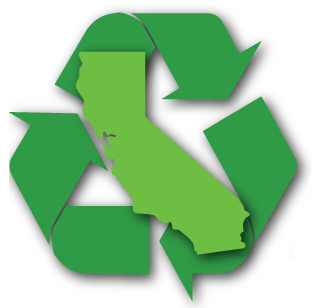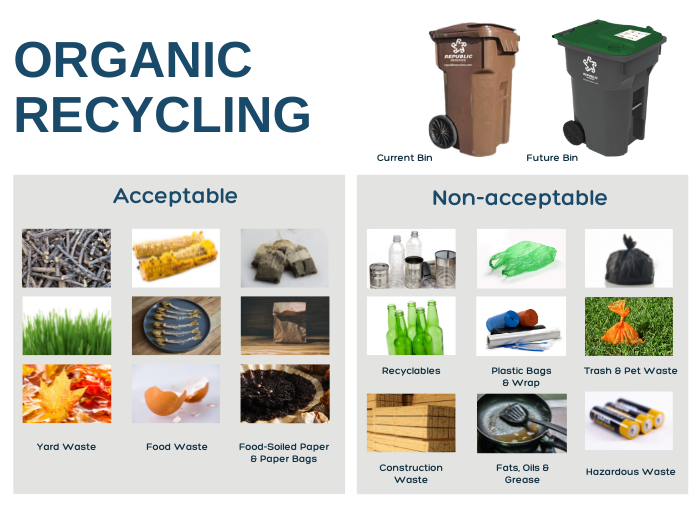 Republic Services is the The City of Villa Park's trash and recycling hauler. Republic Services designed the Recycle Villa Park program with you in mind, and requires very little extra effort from residents. Each single-family residence receives three 96-gallon containers: a tan container for trash, a green container for recyclable items and a brown container for yard waste.
Republic Services is the The City of Villa Park's trash and recycling hauler. Republic Services designed the Recycle Villa Park program with you in mind, and requires very little extra effort from residents. Each single-family residence receives three 96-gallon containers: a tan container for trash, a green container for recyclable items and a brown container for yard waste.
These specially designed containers are lightweight with built-in wheels for easy movement. The automated refuse system uses modern, robotic trucks to empty containers. For your convenience, all containers are collected the same day each week.
New Organics Recycling Legislation!
California Senate Bill 1383 (SB 1383) was enacted to reduce the environmental impacts caused by the release of methane emissions from organic materials decomposing in landfills, as well as to increase statewide edible food recovery efforts beginning January 1, 2022. California landfills remain the third-largest source of methane emissions in the state, contributing to twenty percent of the state’s total methane emissions. Organic waste makes up half of Californians' total waste in landfills. Organic waste includes meat, bones, dairy, fruit and vegetable scraps, food-soiled paper such as napkins and paper towels, yard clippings, and more.
As required by SB 1383, the City of Villa Park has launched an organic recycling program in partnership with the City's waste hauler, Republic Services. Beginning January 1, 2023, Villa Park residents can place organic waste, such as food scraps and yard trimmings, in your existing brown yard waste cart. These changes in service will necessitate an increase in residential and commercial rates. To learn more about how your rates may be affected, please contact Republic Services at (800) 700-8610.
SB 1383 Complaints/Violations
To report SB 1383 compliance issues, please click here. Anonymous complaints may be placed by calling City Hall at (714) 998-1500.
RESIDENTIAL ORGANIC RECYCLING - IN YOUR BROWN BIN

Frequently asked questions:
What items are acceptable?
- Yard waste;
- Food waste; and
- Food-soiled paper & paper.
What items are not acceptable?
- Recyclables;
- Plastic bags & wrap;
- Trash & pet waste;
- Construction waste;
- Fats, oils & grease; and
- Hazardous waste.
What are the benefits of this program?
Recycling organics helps reduce greenhouse gas emissions, creating less air pollution.
What happens to the organic waste after I sort it?
Republic Services will collect the organic waste and transport it to a composting facility, which will turn the organic waste into nutrient-rich fertilizer.
Paper bags?
YES! Only paper bags are allowed and can be used to collect food scraps. You may place a paper bag in the brown organics cart.
Plastic and/or compostable utensils?
No. Plastic bags of any type are not acceptable, even if they are labeled as compostable or biodegradable. Compostable cups, plates, or utensils are also not acceptable.
How do I keep my organics cart clean?
- Line your cart with yard waste first, then place your food waste on top;
- Rinse your cart as needed; and
- Add baking soda to the bottom of your empty cart.
Are fats, oils, or grease considered organic waste?
Fats, cooking oils, and grease are not acceptable in the brown organics cart. Cooled fats, oils, or grease in a sealable container are acceptable in your trash cart.
Will we be getting new containers?
In the future, new waste bins will meet the State's required color scheme. All bins will have a gray body and a unique lid color: black (trash), blue (recycling), and green (organic recycling/yard waste).
More questions? If you have questions or need help understanding the new organic recycling program requirements, please contact Republic Services at 800-700-8610. You can also visit Republic Services' website.
Food Waste vs. Wasted Food
Where food waste refers to things like a banana peel or the crust off a peanut butter and jelly
sandwich, wasted food takes on a different identity. Wasted food is wholesome, nutritious food
that isn’t spoiled, such as unsold food from stores and untouched prepared food or trimmings from restaurants, grocery stores, cafeterias or industrial processing. You can help prevent and divert food waste and wasted food from our local landfills by:
- Making a smart grocery list: Reduce wasted food by making a grocery list, inventorying your cabinets and buying less.
- Love your leftovers: Date leftovers and take them to work for a simple lunch.
- Make it work: Use 'Kitchen Sink' recipes to use up what's left in your fridge.
- Composting: Start your own compost area at home with scraps and yard trimmings that can be added to a compost bin.
Abound Food Care
In October of 2014, Governor Brown signed Assembly Bill 1826 requiring recycling of organic material from businesses beginning April 1, 2016.
Organic waste includes:
- Food waste
- Paper plates, napkins mixed with food waste
- Landscape waste material, such as grass, leaves, and pruning waste
- Untreated wood waste (treated wood waste is injected or coated with hazardous chemicals and is not suitable for composting)
- Restaurants can reduce organic waste and trash disposal costs by donating edible food to food rescue and food banks to help reduce hunger. Instead of using up expensive shelf space for those items that just aren’t selling, but are perfectly edible, you can donate the food to make room for new items.
Hunger is not new, but what is new is our ability to work together to end it in Orange County. Abound Food Care is a public/private partnership of the OC Health Care Agency, restaurants, food banks, and community leaders working together to facilitate the donation and distribution of surplus food to the needy. The City of Villa Park has partnered with Abound Food Care in asking our restaurants to divert food waste to its greatest good, feeding those that do not have enough to eat. Through Abound, non-residential food waste is picked up and donated to those in need. All that is required is that the donated food is handled and stored in a safe, sanitary manner, and maintained in the same manner as food sold to your customers.
The City's goal is to have Abound Food Care and restaurants collaborate and reduce the amount of food thrown out. Abound Food Care is a win-win for the community. It helps restaurants reduce organic waste and trash disposal costs, provides food to those in need, and gives businesses a charitable giving opportunity for tax purposes.
For more information about Abound Food Care, visit their website at Home - Abound Food Care.
Donating edible food is a good way to demonstrate that you’re a money-wise and caring member of the community. In Orange County, food donation can also be achieved by contacting the Second Harvest Food Bank at www.feedingoc.org.
SB 1383 Requirements for Landscapers
Landscape companies are reminded that it is no longer legal to dispose of legal to dispose of green waste in trash containers or landfills. Landscape companies are required to comply with SB 1383 requirements. Click here for a list of organics recycling facilities.
AB 1826
The AB 1826 Chesbro, signed by Governor Jerry Brown in October of 2014, requires businesses to recycle their organic waste depending on the amount of waste they generate per week. Organic waste includes food waste, green waste, and food-soiled paper waste mixed in with food waste. California deposits approximately thirty million tons of waste. This law is meant to utilize the thirty percent of the waste that can be used for compost or mulch, both being possible sources of renewable energy and fuel.
The mandatory commercial organics recycling has been in the process of being phased in statewide. The phase progression are as follows:
· January 1, 2017: Businesses that generate 4 cubic yards of organic waste per week shall arrange for organic waste recycling services.
· August 1, 2017 and Ongoing: Jurisdictions shall provide information about their organic waste recycling program implementation in the annual report submitted to CalRecycle. (See above for description of information to be provided.)
· Fall 2018: After receipt of the 2017 annual reports submitted on August 1, 2018, CalRecycle shall conduct its formal review of those jurisdictions that are on a two-year review cycle.
· January 1, 2019: Businesses that generate 4 cubic yards or more of commercial solid waste per week shall arrange for organic waste recycling services.
· Fall 2020: After receipt of the 2019 annual reports submitted on August 1, 2020, CalRecycle shall conduct its formal review of all jurisdictions.
· Summer/Fall 2021: If CalRecycle determines that the statewide disposal of organic waste in 2020 has not been reduced by 50 percent of the level of disposal during 2014, the organic recycling requirements on businesses will expand to cover businesses that generate 2 cubic yards or more of commercial solid waste per week. Additionally, certain exemptions may no longer be available if this target is not met.
Click here to learn more!
AB 341
The commercial sector generates nearly three fourths of the waste in California much of which is recyclable.
The Mandatory Recycling Law (AB 341) states that businesses generating four cubic yards or more of commercial solid waste per week or more shall arrange for recycling services starting July 1, 2012. Businesses can take one or any combination of the following to divert solid waste from disposal: self-haul, arrange for the pickup of recyclable materials, and/or subscribe to a recycling service that may include mixed waste processing to remove recyclable materials.
Visit the CalRecycle website for more information about the Mandatory Recycling Law. Please contact Republic Services to sign up for recycling or find out about your recycling options for compliance.
Construction and Demolition
What are Construction & Demolition Materials?
• Brick • Drywall • Other Masonry • Cardboard • Green Waste
• Paper • Carpet • Lumber • Plastic • Concrete • Metals
All contractors or owner-builders applying for a permit are required to complete a project form and attest that only an authorized City agent will be used to haul debris and other solid waste generated by that project. A prompt, safe waste collection and disposal will keep your job sites running smoothly. Republic Services offers waste audits, cost analysis, program design, recycling and equipment specifications for projects of all sizes.
Click here for more information about C & D Recycling!
Free Hazardous Waste Disposal
Leftover household products that contain corrosive, toxic, ignitable or reactive ingredients are considered household hazardous waste or HHW. Products such as paints, cleaners, oils, batteries and pesticides that contain potentially hazardous ingredients require special care when you dispose of them.
Orange County residents can dispose of their Household Hazardous Waste items for FREE at any of the County's four Household Hazardous Waste Collection Centers. Please note, the OC Hazardous Waste Collection Centers are not permitted to accept waste from businesses, churches, schools, non-profit organizations or government agencies, or from residents outside of Orange County. Additional HHW services may be available through your city. Contact your city's recycling coordinator to find out other ways to dispose of your HHW items in your community.
For locations, hours of operation, and more information, please click here.